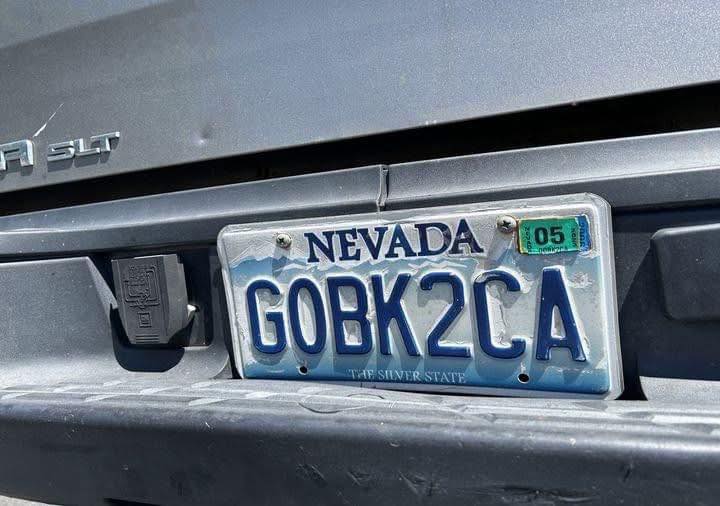If you take a closer look at some personalized license plates, you’ll notice that not all of them are just about fun or self-expression—some carry hidden messages that can spark strong reactions. That’s exactly what happened recently with a Nevada license plate that went viral after people realized what it actually said.

At first glance, it might not have seemed like a big deal, but once the message became clear—“Go back to California”—it quickly gained attention on social media, racking up more than 80,000 likes on Facebook. The plate’s blunt message hit a nerve, particularly in a region where tensions between locals and transplants can run high. While some found it humorous or relatable, others felt it was inappropriate or downright offensive.
The buzz eventually led the Nevada Department of Motor Vehicles to step in and recall the plate, citing its message as unsuitable for public display. This isn’t the first time a personalized plate has been pulled by the DMV for crossing the line, and it certainly won’t be the last. In fact, there’s a long list of vanity plates that have been rejected for being considered offensive, suggestive, or inappropriate. Plates like “SAUC3D” and “RAMP4GE” may look cool to some, but state officials flagged them for their potentially violent undertones. Others, such as “F4K3 T4XI” and “BUYAGRAM,” raise concerns about references to illegal activities or adult content.
While many of these combinations seem clever or edgy at first, the review process in place is meant to prevent any plates that might be interpreted as vulgar, threatening, or promoting criminal behavior. The process for getting a personalized plate isn’t as simple as just requesting a clever phrase and slapping it on your car. Each state, including Nevada, has a dedicated review group that carefully evaluates every application.
This team looks at each proposed plate from multiple angles, trying to catch any hidden meanings, plays on words, or abbreviations that could raise eyebrows. Their job is to make sure that what ends up on the road aligns with public standards of decency. It’s a balancing act between allowing free expression and maintaining a sense of decorum in public spaces. What’s interesting is that data shows men are more likely than women to request customized plates, often using them as a way to show off personality, hobbies, or humor. While some people use their plates to reference their profession, car model, or favorite sports team, others push boundaries with coded language or innuendo. Some try to sneak inappropriate meanings past the DMV by replacing letters with numbers or using slang or acronyms not immediately recognizable. But the review team is generally sharp at catching these tactics, even going as far as using urban dictionaries or crowd-sourced platforms to stay up-to-date on slang and trending phrases. Of course, there are also cases where the intention behind a plate is misinterpreted. A plate might be rejected because it looks like it contains offensive content, even if the applicant didn’t mean it that way. When that happens, some applicants will appeal the decision, hoping to explain the intended meaning and convince the DMV to change its mind. However, most appeals are unsuccessful, especially if the message has any chance of being misunderstood by the general public. The “Go back to California” plate highlights the broader issue of how personalization can sometimes turn into provocation. With more people than ever customizing their cars, the line between self-expression and public offense can get blurry. Personalized plates are a popular way to stand out and make a statement, but they also come with the responsibility of keeping that message respectful and appropriate for all audiences. While some see these plates as a harmless form of humor or regional pride, others view them as divisive or even hostile. As a result, DMVs across the country continue to monitor and regulate custom plate requests to ensure they reflect the values and standards of the community. So next time you spot a clever plate on the road, take a second look—it might be hiding more than you think, and not all messages are meant to be shared in traffic.





